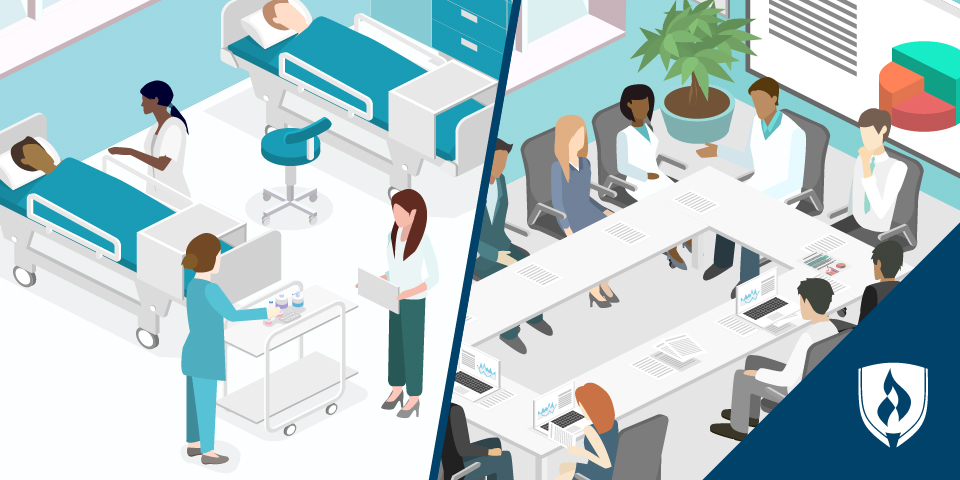
Are you considering a career as a medical administrator? This role is integral to the efficient operation of healthcare facilities, such as hospitals and clinics, where administrators ensure everything runs smoothly behind the scenes.
Whether you're drawn to managing resources, improving patient care, or leading teams, understanding how to become a medical administrator is the first step toward a fulfilling pathway with numerous opportunities for growth.
Medical administrators are the backbone of healthcare operations, playing a crucial role in the strategic planning, management, and coordination of services within a healthcare facility. They oversee everything from staffing and budgeting to compliance with healthcare regulations. Their work ensures that the facility can provide high-quality care to patients while staying financially and operationally sound.
As healthcare continues to develop alongside new technologies, the demand for skilled medical administrators is expected to grow, making this a promising career choice for those interested in the intersection of healthcare and management.
Steps to become a medical administrator
1. Obtain a solid educational foundation
To start your path as a medical administrator, you’ll need a solid educational foundation.
Most often, this involves earning a bachelor’s degree in healthcare administration or a related field, such as business management or healthcare management, and some may choose to pursue a graduate degree for advanced opportunities.
While a bachelor’s degree is often sufficient for entry-level positions, pursuing a master’s degree in healthcare administration may enhance your prospects, potentially leading to higher-level roles and leadership opportunities.
2. Gain relevant knowledge
During your educational journey, you may gain knowledge in various areas relevant to healthcare administration. These include:
- Healthcare policy and law
- Financial management
- Healthcare ethics
- Human resources
- Information systems
3. Pursue internships or practical experience
Pursuing internships or practical experience opportunities during your academic years can greatly enhance your understanding of the practical aspects of medical administration.
These hands-on experiences can offer valuable insights into the daily operations of healthcare facilities, the challenges faced by administrators, and the importance of effective communication and decision-making in a fast-paced environment.
Rasmussen University’s Healthcare Associate’s degree Healthcare Administration Specialization, Healthcare Associate’s degree Medical Administrative Assistant Specialization, Healthcare Management Bachelor’s degree, and Master of Healthcare Administration programs do not offer internship or practical experience opportunities to those enrolled in these programs.
4. Stay updated on advancements
Staying updated on the latest advancements in healthcare technology and regulations is crucial for a successful career in medical administration.
Attending conferences, workshops and seminars can help you network with industry professionals, gain new perspectives and stay informed about trends that may impact the healthcare landscape.
Essential skills needed for healthcare administrators
Beyond your degree, certain skills are crucial for thriving as a medical administrator. For example, adaptability is important due to the constantly evolving nature of healthcare. Understanding patient and provider needs through empathy can also make a difference in managing a healthcare facility effectively.
Empathy is another key skill, as it enables administrators to understand and address the needs of both patients and healthcare providers. This emotional intelligence helps in creating a supportive and patient-centered environment, which can improve the overall quality of care and staff satisfaction.
Add strong communication skills to the list – they are vital.
Medical administrators must effectively communicate with a diverse range of individuals, including medical staff, patients, vendors and regulatory bodies. This involves not only conveying information clearly but also listening to feedback and concerns, and facilitating collaboration across departments.
Leadership and decision-making abilities are equally important, as administrators are often tasked with making critical decisions that impact the entire facility.
Finally, having a solid grasp of financial management and budgeting is crucial. Medical administrators are responsible for ensuring that the facility operates within its financial means while still providing high-quality care. This requires a keen understanding of financial principles and the ability to make strategic decisions that balance cost efficiency with patient care.
Career pathway steps
With your education and skills in hand, you’re ready to step into the realm of medical administration. Here’s a detailed look at the typical career pathways in this field:
Entry-level positions
Many begin as administrative assistants or office managers, gaining hands-on experience in daily operations. These roles provide a solid foundation and understanding of the healthcare facility's inner workings.
Supervisory and middle-management roles
After gaining experience in entry-level positions, you might move into supervisory or middle-management roles, such as a department administrator. This role involves overseeing specific areas within the healthcare facility, such as finance, human resources, or operations.
Executive-level positions
With sufficient experience, opportunities for executive-level positions may arise. These roles come with increased responsibility and require strong leadership and strategic decision-making abilities.
Specializations
As you progress in your career, you may choose to specialize in a particular aspect of medical administration, such as healthcare informatics or compliance management. Specializing can open up new opportunities for advancement and allow you to become an expert in a niche area of the field.
Additional education beyond a bachelors degree in health sciences/business and/or related work experience may be required to work in the field of health informatics or compliance management. It is important to check with employers regarding requirements. Rasmussen University does not offer any degree programs that specialize in health informatics or compliance management.
Networking and continuing education
Networking and continuing education are crucial for career growth in medical administration. Attending industry conferences, joining professional organizations and pursuing certifications can help you stay current with industry trends and expand your professional network.
Certifications, licenses and continuing education
Some states may require medical administrators to obtain specific licenses or certifications. These requirements vary by state. Research and understand the regulations in your area to ensure compliance. Meeting these requirements is crucial for legally practicing as a medical administrator in your state.
Industry certifications
Certified Medical Manager (CMM)1
- Offered by the Professional Association of Health Care Office Management.
- Enhances your professional credentials and demonstrates expertise in managing healthcare facilities.
Certified Professional in Healthcare Information and Management Systems (CPHIMS®)1
- Demonstrates proficiency in healthcare information and technology systems.
- Essential for managing electronic health records and ensuring compliance with data privacy regulations.
- Signifies a high level of expertise in the technological aspects of healthcare administration.
Continuing Education and Industry Trends
By committing to ongoing education, you can enhance your professional standing and effectiveness as a medical administrator.
Continuing education opportunities
- Pursuing workshops and seminars on healthcare administration.
- Helps professionals expand their knowledge and skills.
Staying abreast of industry trends
- Essential for effectively navigating the evolving healthcare landscape.
- Engaging in continuous learning ensures you remain updated with the latest best practices and innovations in the field.
Career growth in healthcare administration
When looking for a job as a medical administrator, explore online job boards, both healthcare-specific and general. Networking through professional associations and attending industry conferences can also uncover valuable opportunities. These platforms and events often list job openings and can connect you with potential employers.
Highlight your unique experiences
In a competitive job market, it’s crucial to differentiate yourself by highlighting your unique skills and experiences. Tailoring your resume and cover letter to specifically align your background with the requirements of the medical administration roles you're pursuing can significantly boost your chances of securing interviews.
Also, make sure to emphasize your qualifications, relevant experience, and any specialized certifications that set you apart from other candidates. By clearly articulating how your expertise and achievements make you the ideal fit for the role, you can capture the attention of potential employers and stand out in the hiring process.
Health Science Degrees at Rasmussen University
Pursuing a health science degree typically demands dedication, proper education and a mix of essential skills. By earning the right degree, honing your organizational and leadership talent and keeping up with industry trends, you can work towards building a successful career in this rewarding field.
Now that you’ve learned the steps to become a medical administrator, it’s time to take the next step toward a rewarding career in healthcare leadership.
At Rasmussen University, our Master of Healthcare Administration program is designed to equip you with the advanced skills and knowledge needed to excel in this critical role. With flexible online courses, experienced faculty and a curriculum focused on real-world application, we’re here to help you succeed.
CPHIMS® is a registered trademark of Healthcare Information and Management Systems Society One
1Rasmussen University does not offer any programs that prepare students to sit for the Certified Medical Manager (CMM) examination.




